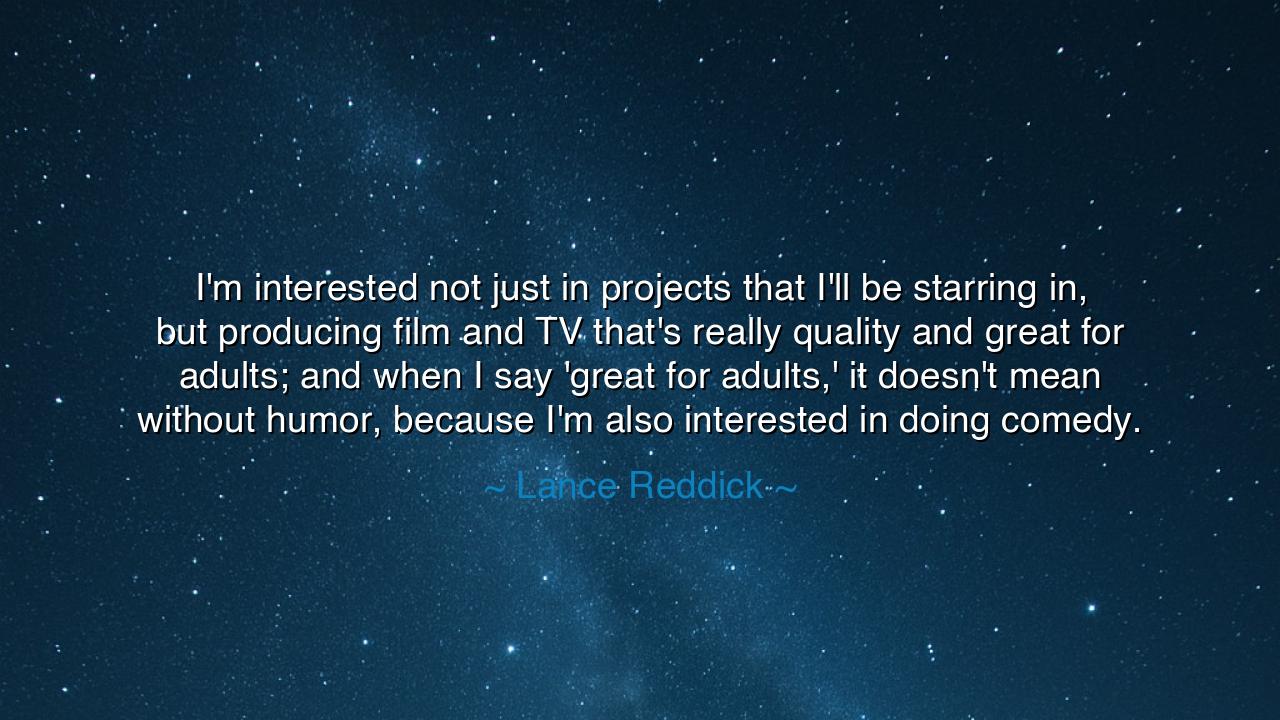
I'm interested not just in projects that I'll be starring in, but
I'm interested not just in projects that I'll be starring in, but producing film and TV that's really quality and great for adults; and when I say 'great for adults,' it doesn't mean without humor, because I'm also interested in doing comedy.






The late Lance Reddick, whose voice carried both command and compassion, once said: “I’m interested not just in projects that I’ll be starring in, but producing film and TV that’s really quality and great for adults; and when I say ‘great for adults,’ it doesn’t mean without humor, because I’m also interested in doing comedy.” In this declaration, we hear not the ambition of a mere performer, but the vision of a builder, a man who understood that true art does not divide solemnity from laughter, nor wisdom from joy. His words rise like a teaching for all who seek to create: that maturity is not the death of humor, and that greatness, to endure, must embrace the full range of the human soul.
Reddick’s life in art was marked by depth — by roles of gravity and grace. Yet within him burned a quiet rebellion against the narrow image of what it means to be “serious.” When he speaks of works that are “great for adults,” he does not mean grim tales stripped of warmth, but stories that honor the complexity of being human. For adulthood, in its truest sense, is not an exile from joy, but a reconciliation of wisdom and laughter, of responsibility and wonder. The ancients would have called such balance sophrosyne — the harmony of emotion and reason, the calm center within the storm of life.
From this understanding flows his reverence for humor, which he refuses to cast aside even as he speaks of high art. To Reddick, comedy is not the lesser sibling of drama but its equal and necessary counterpart. Laughter, after all, is the oldest medicine of the soul. The great tragedians of Greece, whose solemn plays explored fate and sorrow, were also masters of comedy, for they knew that the heart that cannot laugh cannot endure tragedy either. Reddick, like them, perceived that humor reveals truth no less than pain does — that in the smile, there lives a kind of enlightenment that tragedy alone cannot grant.
Consider the tale of Marcus Varro, a Roman scholar who survived the fall of his fortune through laughter. When his villa was seized by Caesar’s soldiers, Varro reportedly quipped, “They are better caretakers of my house than I ever was.” His humor did not erase his loss — it transformed it. Through that jest, he reclaimed his dignity and refused despair. So too did Reddick, in his vision of film and television, seek to uplift rather than to wound — to create works that reflect the real struggles of life while still allowing space for lightness, grace, and resilience. His was a belief not in entertainment for its own sake, but in storytelling as redemption through humanity.
In his words, there is also a lesson in humility. Though known for his commanding presence on screen, Reddick’s heart was that of a servant of the craft, not its master. He speaks not of dominance, but of creation — of producing, nurturing, and shaping art that serves others. This is the wisdom of the elder artist: to use one’s gifts not only to shine, but to illuminate others. He reminds us that legacy is not built from applause, but from contribution — from lifting others to the stage, from giving back to the world what the world once gave to you.
Thus, the lesson in Reddick’s words is twofold: to live and create with balance, and to build not merely for oneself, but for the greater good. In your own life, seek projects and paths that nourish both the mind and the heart. Do not believe that to be wise you must be solemn, nor that to be joyful you must be foolish. Cultivate seriousness that laughs, and humor that thinks. For true greatness, as Reddick teaches, is not found in extremes — it is found in harmony.
And finally, remember this: when you labor to create — whether art, work, or legacy — let it be both honest and joyful, deep and humane. Do not forget to laugh, even when your purpose is grave, for laughter is the breath of the divine within man. As Lance Reddick’s life reminds us, the noblest art is that which touches both the heart and the spirit — great for adults, yes, but still alive with the child’s wonder that keeps the soul awake.






AAdministratorAdministrator
Welcome, honored guests. Please leave a comment, we will respond soon